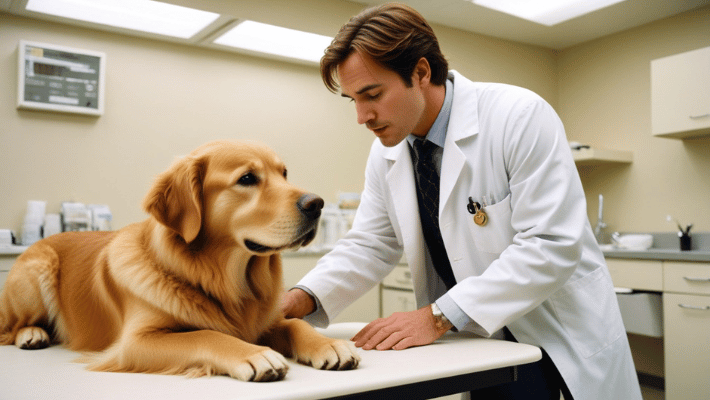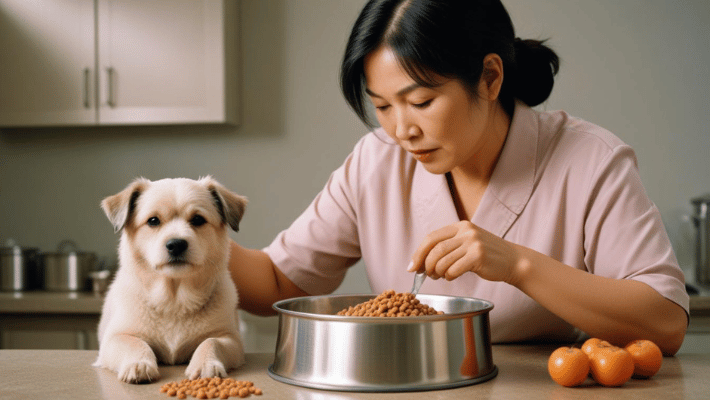Your Dog Throwing Up Undigested Food? Understanding The Common Causes and Treatments


For a dog owner, it’s always concerning when your furry companion starts exhibiting unusual behavior, especially when it comes to their digestive system. If you’ve noticed your dog throwing up undigested food, you’re likely wondering what could be causing this unsettling issue. Rest assured, you’re not alone in this experience, and there are several potential reasons behind this occurrence.
Witnessing your beloved pet regurgitating partially digested or undigested food can be a distressing sight. However, it’s essential to remain calm and approach the situation with a logical mindset. In this comprehensive guide, we’ll explore the various causes, diagnostic methods, and treatment options available to help you navigate this challenging situation effectively.
By understanding the underlying reasons for your dog’s vomiting, you’ll be better equipped to provide the necessary care and support they need. So, let’s dive in and unravel the mystery behind your dog throwing up undigested food.
Common causes of dogs throwing up undigested food

There are numerous potential causes that could lead to your dog throwing up undigested food. Here are some of the most common culprits:
- Dietary Indiscretion: Dogs are notorious for their adventurous eating habits, and sometimes they consume things they shouldn’t. From table scraps and garbage to toys or other inedible objects, these dietary indiscretions can lead to vomiting as the body attempts to expel the offending item.
- Food Intolerance or Allergy: Just like humans, dogs can develop food intolerances or allergies to certain ingredients in their diet. This can cause digestive upset, including vomiting undigested food.
- Gastrointestinal Issues: Various gastrointestinal problems, such as inflammatory bowel disease, pancreatitis, or intestinal blockages, can interfere with proper digestion and lead to vomiting.
- Eating Too Quickly: Some dogs have a tendency to gulp down their food too quickly, which can result in regurgitation or vomiting of undigested food.
- Stress or Anxiety: Emotional distress or anxiety can also contribute to vomiting in dogs, as stress can affect their digestive system.
- Medications or Toxin Exposure: Certain medications or accidental ingestion of toxic substances can irritate the gastrointestinal tract, leading to vomiting.
It’s important to note that occasional vomiting is not necessarily a cause for immediate concern. However, if the vomiting persists or is accompanied by other concerning symptoms, it’s crucial to seek veterinary attention.
Diagnosing the problem: What tests and examinations may be necessary?

To accurately diagnose the cause of your dog’s vomiting and determine the appropriate course of action, your veterinarian may recommend various tests and examinations. Here are some common diagnostic procedures:
- Physical Examination: Your veterinarian will perform a thorough physical examination, including checking your dog’s vital signs, palpating the abdomen, and assessing overall health.
- Medical History and Dietary Review: Your veterinarian will ask about your dog’s medical history, recent diet changes, and any potential exposure to toxins or foreign objects.
- Fecal Examination: A fecal sample may be analyzed to check for parasites, bacterial or viral infections, or other gastrointestinal issues.
- Blood Tests: Blood tests can help detect underlying conditions such as liver or kidney disease, pancreatitis, or other metabolic disorders that could contribute to vomiting.
- Imaging Tests: Depending on the suspected cause, your veterinarian may recommend imaging tests like X-rays or ultrasounds to examine the gastrointestinal tract for potential obstructions, masses, or other abnormalities.
- Endoscopy or Exploratory Surgery: In some cases, an endoscopy (a procedure where a small camera is inserted into the digestive tract) or exploratory surgery may be necessary to visualize and diagnose the underlying issue.
By conducting these diagnostic tests, your veterinarian can pinpoint the root cause of your dog’s vomiting and develop an appropriate treatment plan tailored to their specific needs.
Treating your dog’s vomiting: Home remedies and when to seek veterinary care

In some cases, mild and occasional vomiting may resolve on its own with proper home care. However, it’s crucial to know when to seek veterinary assistance. Here are some home remedies and guidelines for when to consult a professional:
Home Remedies:
- Withhold Food and Water: If your dog has been vomiting, it’s recommended to withhold food and water for a few hours to allow their digestive system to rest. After a few hours, you can offer small amounts of water or ice chips to prevent dehydration.
- Bland Diet: Once your dog has stopped vomiting, gradually introduce a bland diet, such as boiled chicken and rice or a prescription gastrointestinal diet recommended by your veterinarian. This can help soothe their digestive system.
- Probiotics and Digestive Enzymes: Supplementing with probiotics or digestive enzymes can help restore the balance of gut bacteria and aid in digestion.
- Anti-nausea Medications: Over-the-counter anti-nausea medications, such as Pepto-Bismol or Dramamine, can be given in small doses to help alleviate nausea and vomiting. However, it’s essential to consult your veterinarian before administering any medications to your dog.
When to Seek Veterinary Care:
While home remedies can be helpful in mild cases, it’s crucial to seek veterinary care in the following situations:
- If the vomiting persists for more than 24 hours or is accompanied by other concerning symptoms like lethargy, diarrhea, or blood in the vomit.
- If your dog is unable to keep any food or water down, leading to dehydration.
- If your dog appears to be in distress or experiencing abdominal pain.
- If you suspect your dog has ingested a foreign object or toxic substance.
Your veterinarian can provide professional medical care, including administering anti-nausea medications, fluids for dehydration, or other treatments based on the underlying cause of the vomiting.
Preventing your dog from throwing up undigested food

While it’s not always possible to prevent vomiting entirely, there are several steps you can take to reduce the likelihood of your dog throwing up undigested food:
- Feed a High-Quality Diet: Providing your dog with a balanced, high-quality diet formulated for their specific life stage and breed can help promote proper digestion and reduce the risk of gastrointestinal issues.
- Establish a Consistent Feeding Schedule: Feeding your dog at consistent times each day can help regulate their digestive system and prevent overeating or gulping down food too quickly.
- Use Puzzle Feeders or Slow Feeders: These specialized bowls or feeders can encourage slower eating habits, reducing the risk of vomiting due to rapid ingestion.
- Provide Adequate Exercise: Regular exercise can aid in digestion and prevent issues like bloat, which can contribute to vomiting.
- Limit Access to Potential Toxins or Foreign Objects: Keeping your dog away from potentially harmful substances or objects they might ingest can reduce the risk of vomiting due to ingestion of inappropriate items.
- Manage Stress and Anxiety: If your dog’s vomiting is related to stress or anxiety, identifying and addressing the underlying triggers can help alleviate the issue.
By implementing these preventive measures, you can help minimize the likelihood of your dog throwing up undigested food and promote overall digestive health.
Dietary changes to address your dog’s vomiting
In some cases, making dietary adjustments can be an effective way to manage and prevent your dog’s vomiting. Here are some potential dietary changes to consider:
- Transition to a Bland Diet: If your dog has been vomiting, transitioning to a bland diet, such as boiled chicken and rice or a prescription gastrointestinal diet, can help soothe their digestive system and provide easily digestible nutrients.
- Introduce a Limited Ingredient Diet: Dogs with food allergies or sensitivities may benefit from a limited ingredient diet that eliminates potential trigger foods. This can help identify and manage food-related intolerances.
- Increase Fiber Intake: Adding a fiber supplement or increasing the fiber content in your dog’s diet can aid in digestion and help regulate their bowel movements, potentially reducing vomiting episodes.
- Introduce Probiotics and Digestive Enzymes: Supplementing with probiotics and digestive enzymes can help restore the balance of gut bacteria and improve digestion, potentially alleviating vomiting issues.
- Adjust Portion Sizes and Feeding Frequency: If your dog is prone to overeating or gulping down their food too quickly, adjusting portion sizes and feeding more frequent, smaller meals can help prevent vomiting due to rapid ingestion.
- Consult with a Veterinary Nutritionist: In some cases, consulting with a veterinary nutritionist can be beneficial in developing a customized dietary plan tailored to your dog’s specific needs and digestive issues.
It’s important to note that any significant dietary changes should be done gradually and under the guidance of your veterinarian to ensure a smooth transition and avoid potential complications.
Other potential medical causes of your dog’s vomiting

While dietary factors are a common cause of vomiting in dogs, there are other potential medical conditions that can contribute to this issue. Here are some additional medical causes to be aware of:
- Gastrointestinal Disorders: Various gastrointestinal disorders, such as inflammatory bowel disease, pancreatitis, or intestinal obstructions, can lead to vomiting and other digestive issues.
- Liver or Kidney Disease: Liver and kidney diseases can interfere with the body’s ability to process and eliminate toxins, leading to nausea and vomiting.
- Endocrine Disorders: Hormonal imbalances, such as those associated with diabetes or Addison’s disease, can affect the digestive system and contribute to vomiting.
- Neurological Conditions: Certain neurological conditions, like vestibular disease or brain tumors, can cause nausea and vomiting as a secondary symptom.
- Infections: Viral, bacterial, or parasitic infections can irritate the gastrointestinal tract and lead to vomiting, diarrhea, and other digestive issues.
- Medication Side Effects: Certain medications, such as chemotherapy drugs or certain antibiotics, can cause nausea and vomiting as a side effect.
If your dog’s vomiting persists despite dietary changes or home remedies, it’s crucial to consult with your veterinarian to rule out any underlying medical conditions and receive appropriate treatment.
When to consult a veterinarian: Knowing when it’s time for professional help

While occasional vomiting may not be a cause for immediate concern, there are certain situations where it’s essential to seek professional veterinary care. Here are some guidelines to help you determine when it’s time to consult a veterinarian:
- Persistent Vomiting: If your dog has been vomiting for more than 24 hours or is unable to keep any food or water down, it’s crucial to seek veterinary attention to prevent dehydration and address the underlying cause.
- Presence of Blood or Unusual Substances: If you notice blood, foreign objects, or unusual substances in your dog’s vomit, it’s important to have them evaluated by a veterinarian as soon as possible.
- Accompanying Symptoms: If your dog’s vomiting is accompanied by other concerning symptoms, such as lethargy, diarrhea, loss of appetite, weight loss, abdominal pain, or fever, it’s essential to seek prompt medical attention.
- Puppies or Senior Dogs: Puppies and senior dogs may be more susceptible to dehydration and other complications from vomiting, so it’s advisable to consult a veterinarian sooner rather than later.
- Underlying Medical Conditions: If your dog has an existing medical condition, such as diabetes, liver or kidney disease, or a compromised immune system, it’s important to seek veterinary care promptly to address any potential complications.
- Lack of Improvement: If your dog’s vomiting persists despite home remedies or dietary changes, it’s time to consult a veterinarian for further evaluation and treatment.
Remember, it’s always better to err on the side of caution when it comes to your dog’s health. By seeking professional veterinary care when necessary, you can ensure that your furry friend receives the appropriate diagnosis and treatment for their vomiting and any underlying conditions.
Final Thoughts on Dog Throwing Up Undigested Food!
Dealing with a dog throwing up undigested food can be a concerning and frustrating experience for any pet owner. However, by understanding the potential causes, recognizing concerning symptoms, and implementing appropriate preventive measures and treatment options, you can effectively manage this issue and ensure your dog’s well-being.
Additionally, you can also consider seeking professional advice and guidance from your veterinarian or a veterinary nutritionist and create a customized dietary plan that supports your dog’s digestive health.
Remember, your dog’s well-being is the top priority, and with patience, diligence, and the right approach, you can help alleviate their discomfort and ensure they enjoy a happy, healthy life.
READ ALSO:









Leave A Comment